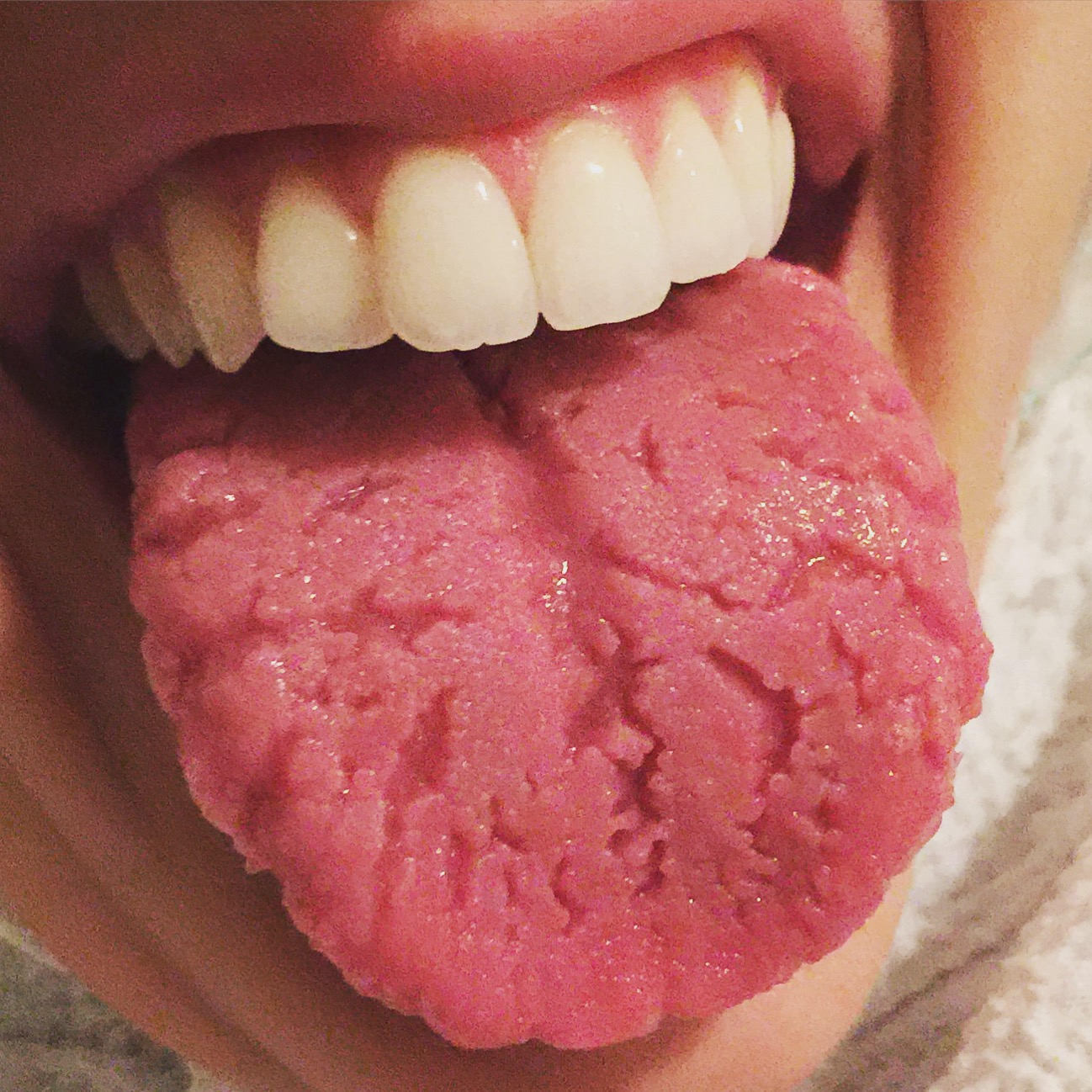What are the symptoms of a fissured tongue?
A fissured tongue, also known as lingua plicata or scrotal tongue, is a benign condition characterized by one or more shallow or deep grooves (fissures) on the surface of the tongue. These fissures can vary in depth and length and may be present on one or both sides of the tongue.
Most people with a fissured tongue do not experience any symptoms, but some may notice:
- Pain or discomfort: In some cases, the fissures may become irritated or inflamed, leading to pain or discomfort, especially when eating spicy or acidic foods.
- Food trapping: Food particles may accumulate in the fissures, leading to bad breath or an unpleasant taste in the mouth.
- Redness or inflammation: The tongue may appear red or inflamed around the fissures, especially if they become irritated or infected.
- Changes in appearance: The tongue may have a wrinkled or furrowed appearance due to the presence of fissures.
- Difficulty with oral hygiene: Cleaning the tongue thoroughly may be challenging due to the presence of fissures, leading to a buildup of bacteria and debris.
Good oral hygiene, including regular brushing of the tongue and keeping the mouth clean, can help prevent complications and reduce the risk of irritation or infection in the fissures. If symptoms of a fissured tongue are present, a dentist or healthcare provider may recommend gentle cleaning of the tongue and, in some cases, the use of an antiseptic mouthwash to reduce the risk of infection.
What are the causes of a fissured tongue?
The exact cause of fissured tongue is not known, but it is believed to be related to a combination of genetic and environmental factors. Some factors that may contribute to the development of a fissured tongue include:
- Genetics: Fissured tongue tends to run in families, suggesting a genetic predisposition to the condition.
- Age: Fissured tongue is more common in older adults, possibly due to changes in the tongue’s structure and function that occur with age.
- Geographic tongue: Some people with fissured tongue may also have a related condition called geographic tongue, which is characterized by patches of smooth, red areas on the tongue that change in shape and size over time.
- Dry mouth: Reduced saliva production, which can occur due to factors such as dehydration, medications, or certain medical conditions, may contribute to the development of fissured tongue.
- Nutritional deficiencies: Some studies suggest that deficiencies in certain vitamins and minerals, such as vitamin B and iron, may be associated with fissured tongue.
- Environmental factors: Factors such as smoking, poor oral hygiene, and irritation from spicy or acidic foods may contribute to the development or exacerbation of fissured tongue.
Fissured tongue is generally considered a benign condition that does not require treatment unless it causes symptoms. However, if you have concerns about your tongue or if you experience persistent symptoms such as pain or discomfort, it is recommended to consult with a dentist or healthcare provider for further evaluation and advice.
How is the diagnosis of a fissured tongue made?
The diagnosis of a fissured tongue is usually made based on a physical examination of the tongue by a healthcare provider. The characteristic appearance of one or more grooves or furrows on the surface of the tongue is typically indicative of a fissured tongue. In some cases, a healthcare provider may use a tongue depressor and light to get a better view of the tongue’s surface.
In some cases, a healthcare provider may also perform additional tests or evaluations to rule out other possible causes of tongue abnormalities, such as:
- Biopsy: In rare cases where there is concern about a more serious underlying condition, such as oral cancer, a biopsy may be performed to obtain a tissue sample for further examination under a microscope.
- Blood tests: Blood tests may be ordered to check for nutritional deficiencies or other underlying health conditions that may be contributing to the fissured tongue.
- Allergy testing: If there is a suspicion of an allergic reaction contributing to the fissured tongue, allergy testing may be recommended.
- Microbial culture: If there are signs of infection, such as redness, swelling, or discharge from the fissures, a microbial culture may be performed to identify the causative organism.
Overall, the diagnosis of a fissured tongue is usually straightforward and can be made based on the characteristic appearance of the tongue.
What is the treatment for a fissured tongue?
Treatment for a fissured tongue is usually not necessary unless the condition is causing symptoms such as pain, discomfort, or difficulty with oral hygiene. In such cases, treatment options may include:
- Oral hygiene: Good oral hygiene practices, such as regular brushing and flossing, can help prevent food particles from accumulating in the fissures and reduce the risk of irritation or infection.
- Gentle cleaning: Cleaning the tongue with a soft toothbrush or tongue scraper can help remove debris and bacteria from the fissures. Avoid using harsh or abrasive cleaners that may further irritate the tongue.
- Antiseptic mouthwash: An antiseptic mouthwash may be recommended to reduce the risk of infection in the fissures. Rinse with the mouthwash according to the manufacturer’s instructions.
- Avoiding irritants: Avoiding spicy, acidic, or rough foods that may irritate the tongue can help prevent symptoms.
- Moisturizing agents: In cases where dry mouth is contributing to the fissured tongue, moisturizing agents such as saliva substitutes or oral moisturizing gels may be recommended.
- Nutritional supplements: If a nutritional deficiency is suspected, supplementation with vitamins or minerals such as vitamin B or iron may be recommended.
It’s important to consult with a dentist or healthcare provider before starting any treatment for a fissured tongue, especially if you are experiencing symptoms. They can provide guidance on the most appropriate treatment approach based on your individual circumstances.

Leave a Reply
You must be logged in to post a comment.